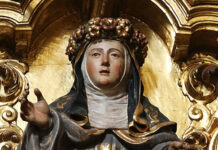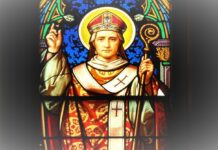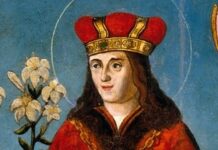
Memorial of Saint Ignatius of Loyola
St. Ignatius of Loyola, priest and founder (†1556). Of Basque nobility, he pursued a military career in his early adulthood. Gravely wounded in battle, he underwent a radical conversion during his convalescence. After a period of recollection and study, he gathered a group of men to undertake apostolic works and with them formed the Company of Jesus, known as the Jesuit Fathers, to defend the Faith as soldiers under the banner of Christ, Ad maiorem Dei gloriam, “For the greater glory of God”. See: Sincere and Religious Love, and Soul Full of Enthusiasm and Logic, by Plinio Corrêa de Oliveira.
Other featured Saints
St. Germanus of Auxerre, bishop (†448). Bishop of Auxerre, France. He was sent to England by the Pope to fight the Pelagian heresy.
Blessed John Colombini, religious (†1307). Wealthy merchant from Siena (Italy); he gave up his riches to embrace a life of extreme poverty. He founded the Congregation of Jesuati to minister to the sick.
Blessed James Buch Canals, martyr (†1936). Salesian religious, imprisoned and killed in Valencia during the Spanish Civil War.
St. Fabius, martyr (†303/304). Christian condemned to death in Caesarea (Mauritania), present day Algeria, for refusing to carry the flag of the governor in a pagan ceremony.
Blessed Franz Stryjas, martyr (†1944). Father of a family imprisoned and killed in Kalisz, Poland, after undergoing prolonged torture.
Blessed Zdenka Schelingová, virgin and martyr (†1955). Religious from the Congregation of the Sisters of Charity of the Holy Cross. She aided the escape of a priest in Trnava, Czechoslovakia, for which she was imprisoned; she died as a result of her sufferings there.
Mass Readings
First Reading – Lv 25:1, 8-17
The LORD said to Moses on Mount Sinai, “Seven weeks of years shall you count–seven times seven years– so that the seven cycles amount to forty-nine years. Then, on the tenth day of the seventh month, let the trumpet resound; on this, the Day of Atonement, the trumpet blast shall re-echo throughout your land. This fiftieth year you shall make sacred by proclaiming liberty in the land for all its inhabitants. It shall be a jubilee for you, when every one of you shall return to his own property, every one to his own family estate. In this fiftieth year, your year of jubilee, you shall not sow, nor shall you reap the aftergrowth or pick the grapes from the untrimmed vines. Since this is the jubilee, which shall be sacred for you, you may not eat of its produce, except as taken directly from the field. “In this year of jubilee, then, every one of you shall return to his own property. Therefore, when you sell any land to your neighbor or buy any from him, do not deal unfairly. On the basis of the number of years since the last jubilee shall you purchase the land from your neighbor; and so also, on the basis of the number of years for crops, shall he sell it to you. When the years are many, the price shall be so much the more; when the years are few, the price shall be so much the less. For it is really the number of crops that he sells you. Do not deal unfairly, then; but stand in fear of your God. I, the LORD, am your God.”
Responsorial Psalm – 67:2-3, 5, 7-8 (R.4)
R. O God, let all the nations praise you!
May God have pity on us and bless us;
may he let his face shine upon us.
So may your way be known upon earth;
among all nations, your salvation. R.
May the nations be glad and exult
because you rule the peoples in equity;
the nations on the earth you guide. R.
The earth has yielded its fruits;
God, our God, has blessed us.
May God bless us,
and may all the ends of the earth fear him! R.
Gospel – Mt 14:1-12
Herod the tetrarch heard of the reputation of Jesus
and said to his servants, “This man is John the Baptist.
He has been raised from the dead;
that is why mighty powers are at work in him.”
Now Herod had arrested John, bound him, and put him in prison
on account of Herodias, the wife of his brother Philip,
for John had said to him,
“It is not lawful for you to have her.”
Although he wanted to kill him, he feared the people,
for they regarded him as a prophet.
But at a birthday celebration for Herod,
the daughter of Herodias performed a dance before the guests
and delighted Herod so much
that he swore to give her whatever she might ask for.
Prompted by her mother, she said,
“Give me here on a platter the head of John the Baptist.”
The king was distressed,
but because of his oaths and the guests who were present,
he ordered that it be given, and he had John beheaded in the prison.
His head was brought in on a platter and given to the girl,
who took it to her mother.
His disciples came and took away the corpse
and buried him; and they went and told Jesus.














